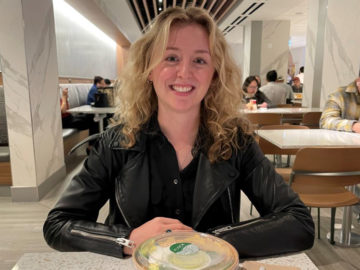Adult Allergies
Awkward Dining: When Food Allergies Turn Into Talk of the Table
Informing a restaurant server of my allergies gets tricky. In work situations, it can stop the whole table's conversation, put all eyes on me, and cue irritating 'jokes'. Here's what to do to avoid this trap.
When I was a kid, I hated the burden of having to disclose my food allergies to my server at a restaurant. At first, my mom would take on the responsibility for me, but by the time I reached double-digits she had passed the task on to me. The reason? She knew this would have to be my responsibility for the rest of my life.
As always, my mom was right – informing the server of my food allergies is one of my most important and frequently employed allergy management habits.
But that doesn’t make it easy. Disclosing my food allergies to my server is often an awkward process. It becomes even more uncomfortable when either or both of the following occur: the server has comments to make about my food allergies, or the people I’m dining out with make comments about my allergies. As it happens, the former often leads to the latter.
First, the server. Sometimes I appreciate when the server makes a comment – for example, when they acknowledge having heard and understood my allergies to peanuts and nuts. This may be by saying something like, “I’ll be sure to let the kitchen know.”
However, sometimes servers make comments that draw extra attention to my food allergies. For example, a server may say something like “how severe is your allergy? “Are seeds OK? Dairy?” Or they may something like: “We have nuts in the kitchen so we can’t guarantee 100 percent that there hasn’t been cross-contamination.”
I can deal with these comments on my own or with family. But it becomes more awkward when I’m out with friends (especially new friends) or work colleagues who may not know me well.
The reality is that having to disclose my food allergies to the server almost inevitably draws unwanted attention to me, and comments from those I’m dining with. It also changes the course of the conversation. We may have been having a lively social or work discussion – but now it’s all about my allergies.
Cue the Bad Jokes and Drama
There are things I wish people would stop saying when they find out about my food allergies. Most of these are joke-type comments, like “guess we won’t order the peanut butter pie!” It’s not the fact that the comment is a joke that bothers me. What I don’t like is that it draws attention to my life-threatening food allergies in a dismissive manner.
How am I supposed to respond to this type of comment? Usually, I just give a fake laugh and say, “guess not, sorry!” and hope the conversation moves on quickly.
Another type of comment I get is the self-reflective, dramatic lament – “My life would be over without peanut butter!” This actually bothers me less because at least it’s not dismissive or condescending. Depending on the mood, it can also offer an avenue for engagement. I can say something like, “I know people love peanut butter, but since I know it could kill me, I don’t really feel like I’m missing out.”
This is a bit blunt, but it may drive home the point to someone who has clearly missed it entirely. I can also add this fun fact: “While you love it, peanut butter smells disgusting to me.”
What I don’t mind getting is the inquisitive style of comment. This comes from a place of genuine curiosity and presents an opportunity to inform. For example, some people have asked me, “Where do you keep your auto-injector” or “Is your allergy also airborne?” I don’t mind answering these questions at all, since they are educational and productive. However, there is still a limit to the extent that I am willing to co-opt the conversation with food allergy talk. Usually after a few questions, I feel – “but enough about me!” – and let’s switch to the next topic.
Warning Without Extra Attention
Communicating your food allergies to the server is clearly an important and necessary food allergy management strategy. Even if you’ve warned a restaurant in advance of your allergies, you always need to remind them in person.
But it’s a tricky balancing act to warn the waiter without having your table’s discussion switch entirely to food allergies. Admittedly, it’s also a balancing act that I haven’t completely mastered.
Here are a couple of approaches that can work. If you want to avoid having your food allergies become the focus of conversation, one suggestion is to say to the server: “Let me catch you when you’re finished with everyone else’s order. I’ll take a bit longer – as I have food allergies.” This may allow the server to come speak to you more privately by your chair. And once their own orders are captured, the rest of the table often continues talking without listening to you, as you list your food allergies and discuss precautions.
Another suggestion is to find the server somewhere off to the side, perhaps after drinks have been served, to walk through your food allergies and ask about a few menu options. Both of these strategies work especially well at larger, formal gatherings, including work events, which can be challenging.
Although disclosing your food allergies in front of others while dining out can be awkward, you can never lose sight of the fact that it is essential. This is one of my most important food allergy management tools, right after avoidance and carrying my auto-injector.
While those of us with food allergies bear the primary responsibility for managing our dietary restrictions, we still need to rely on restaurant staff to help keep us safe while dining out, and we need support from our friends and colleagues to ensure that our social and professional environments are allergy-friendly. I just wish all of this didn’t often come with a side of ignorant or dismissive comments!
Hannah Lank, who is studying law in Toronto, is a regular Allergic Living contributor.
Related Reading:
Step-by-Step Guide to Dining Out with Food Allergies
Going Vegetarian with a Nut Allergy
Will Restaurants Still Welcome We the Allergic


